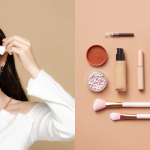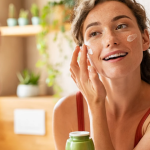Aloe vera is a timeless remedy for all things skin-related. This succulent plant has been used in traditional medicine for its powerful healing properties for thousands of years. Whether you’re suffering from nasty sunburns, breakouts, or dry patches, aloe vera often finds its way into skin-care routines and is loved for its ability to soothe and heal. Today, it’s one of the most widely recognized natural ingredients in skincare, praised for its effectiveness on various skin concerns.
This ultimate guide to aloe vera for skin care covers everything this powerhouse plant offers, including key benefits, uses, and practical tips to maximize its potential. Whether your skin is oily, dry, or acne-prone, aloe vera has something for everyone. Discover its impressive versatility and the ways it can rejuvenate and refresh your skin.
Understanding Aloe Vera
What is Aloe Vera?
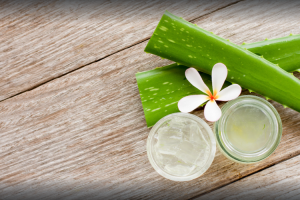 Aloe vera is a succulent plant that flourishes in hot, arid environments. You’ve likely seen it in small potted plants or sprawling in gardens, but beyond its spiky leaves lies the real magic—the clear, gel-like substance found inside. This gel is packed with vitamins, minerals, and enzymes that give aloe vera its reputation as a “miracle plant.” Scientifically known as Aloe barbadensis miller, aloe vera is used in numerous beauty and health products for its healing properties.
Aloe vera is a succulent plant that flourishes in hot, arid environments. You’ve likely seen it in small potted plants or sprawling in gardens, but beyond its spiky leaves lies the real magic—the clear, gel-like substance found inside. This gel is packed with vitamins, minerals, and enzymes that give aloe vera its reputation as a “miracle plant.” Scientifically known as Aloe barbadensis miller, aloe vera is used in numerous beauty and health products for its healing properties.
Aloe vera, known as the “plant of immortality, ” dates back to ancient Egypt. Ancient Egyptians used aloe vera to treat wounds, burns, and various skin ailments. Similarly, it was widely employed in Greek, Roman, Indian, and Chinese traditional medicines for centuries, solidifying its place as a global skincare staple.
Key Components and Benefits
So, what makes aloe vera so unique? The gel within its leaves contains over 75 active compounds that work harmoniously to benefit your skin. Here are a few key players:
- Vitamins: Aloe vera is rich in vitamins A, C, and E, powerful antioxidants that combat free radicals and protect the skin from damage.
- Enzymes: Specific enzymes like bradykinase help reduce inflammation and soothe irritated skin.
- Minerals: Calcium, magnesium, and zinc aid healing and offer mild astringent properties, keeping the skin clear and fresh.
- Polysaccharides: These long chains of sugar molecules lock in moisture, giving aloe vera its signature hydrating ability.
Aloe vera’s anti-inflammatory, antimicrobial, and moisturizing properties make it a multitasker. Whether you’re fighting redness, irritation, or dryness, aloe vera is here to help.
Aloe Vera for Skin Care
Benefits for Different Skin Types
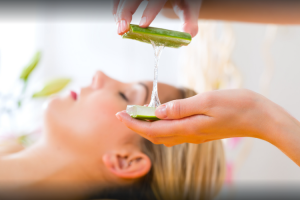 Aloe vera’s versatility suits a wide range of skin types. Let’s break down how it caters to each skin type:
Aloe vera’s versatility suits a wide range of skin types. Let’s break down how it caters to each skin type:
- Dry Skin: Aloe vera replenishes moisture without clogging pores thanks to its hydrating properties. It creates a shield on the skin, locking in moisture.
- Oily Skin: Aloe vera is non-greasy, hydrating the skin without making it oily. Its astringent properties can also help balance excess sebum production.
- Sensitive Skin: Aloe vera’s calming nature makes it perfect for soothing sensitive or inflamed skin. It reduces redness and irritation without causing further discomfort.
- Acne-Prone Skin: Aloe vera has antibacterial and anti-inflammatory properties, which can help reduce acne. It speeds up the healing process of pimples and minimizes scarring.
Specific Uses and Applications
Here’s a closer look at some of the ways you can use aloe vera in your daily skincare routine:
- Sunburn Relief and After-Sun Care: Aloe vera gel is legendary for treating sunburns. It cools the skin, provides hydration, and speeds up healing, making it a must-have for post-sun care.
- Minor Cuts, Scrapes, and Burns: The anti-inflammatory and antimicrobial properties of aloe vera make it an excellent remedy for treating minor wounds. Applying aloe vera gel can accelerate the healing process and reduce scarring.
- Soothing Irritated or Inflamed Skin: Aloe vera can offer relief by calming irritation and reducing redness if you have skin conditions like rosacea or dermatitis.
- Managing Acne and Blemishes: Aloe vera’s antibacterial properties help prevent acne-causing bacteria from spreading, while its anti-inflammatory compounds reduce redness and swelling associated with breakouts.
- Moisturizing and Hydrating: If your skin is craving hydration, aloe vera provides lightweight moisture, making it perfect for everyday use. It helps soften and smooth the skin, leaving it feeling refreshed.
- Eczema and Psoriasis: Aloe vera can also relieve chronic skin conditions like eczema and psoriasis, helping soothe itchiness and irritation.
Using Aloe Vera Effectively
Choosing the Right Aloe Vera Product
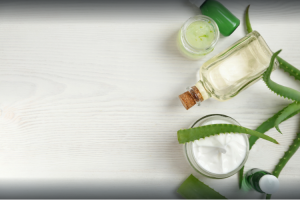 When it comes to using aloe vera for skin care, you have a few options. Here are some popular choices:
When it comes to using aloe vera for skin care, you have a few options. Here are some popular choices:
- Fresh Aloe Vera Gel: If you have an aloe vera plant at home, you can harvest the gel directly from the leaves. Cut off a leaf, scoop the gel, and apply it to your skin. It is the purest form of aloe vera and is ideal if you prefer all-natural skincare.
- Bottled Aloe Vera Gel: Many skincare brands offer bottled aloe vera gels, but not all products are created equal. Look for ones with a high percentage of aloe vera and avoid those with added alcohol, artificial colors, or fragrances.
- Aloe Vera-Based Skincare Products: Many lotions, moisturizers, and sunscreens contain aloe vera as a key ingredient. These products often combine aloe vera with other beneficial ingredients, making them suitable for everyday use.
How to Apply Aloe Vera
Proper application of aloe vera is essential for maximizing its benefits. Here’s a simple guide:
- Cleanse Your Skin: Start with clean skin. Use a gentle cleanser to remove dirt and oil. This helps aloe vera absorb better and prevents clogging.
- Prepare Fresh Aloe Vera Gel (If Using the Plant): If you have an aloe plant, cut a healthy leaf, wash it, and extract the gel. Store any unused gel in the fridge. Alternatively, use a high-quality bottled aloe vera gel free of additives like alcohol or artificial fragrances.
- Apply a Thin Layer: Apply a small amount of gel and gently massage it into your skin. Use generously for sunburns and as a spot treatment for acne. Aloe can also be used as a hydrating mask—apply a thin layer and rinse off after 10-15 minutes.
- Massage and Let It Absorb: Gently massage the gel in circular motions to enhance absorption and boost circulation. Let it fully absorb, which usually takes a few minutes. Aloe vera can be used daily or as needed for specific skin concerns.
Tip: Apply aloe vera under your moisturizer to lock in moisture for hydration.
Safety and Precautions
While aloe vera is generally safe, here are vital precautions to keep in mind:
- Patch Test First: Before applying to large areas, do a patch test on your wrist or inner elbow. Wait 24 hours to check for any allergic reactions like redness or itching. If irritation occurs, discontinue the use of aloe vera.
- Use Caution on Sensitive Skin: Aloe vera can irritate susceptible skin, especially if mixed with alcohol or fragrances. Choose hypoallergenic, pure aloe vera products if you have sensitive skin.
- Avoid Latex: Fresh aloe vera leaves contain latex, which can cause allergic reactions. If you’re extracting fresh gel, avoid the yellowish latex by rinsing the leaf thoroughly.
- Don’t Use on Deep Wounds: Aloe vera is excellent for minor cuts and burns but avoid using it on deep wounds or severe burns. For severe injuries, consult a healthcare provider.
- Monitor for Side Effects: Watch for redness, itching, or dryness after using aloe vera. If any of these occur, discontinue use. Some people may experience dryness if used too frequently, so follow up with a moisturizer.
- Consult a Dermatologist: If you have chronic skin conditions like eczema or psoriasis, check with a dermatologist before using aloe vera. It may soothe symptoms but isn’t a substitute for medical treatment.
Aloe Vera Recipes and DIY Ideas
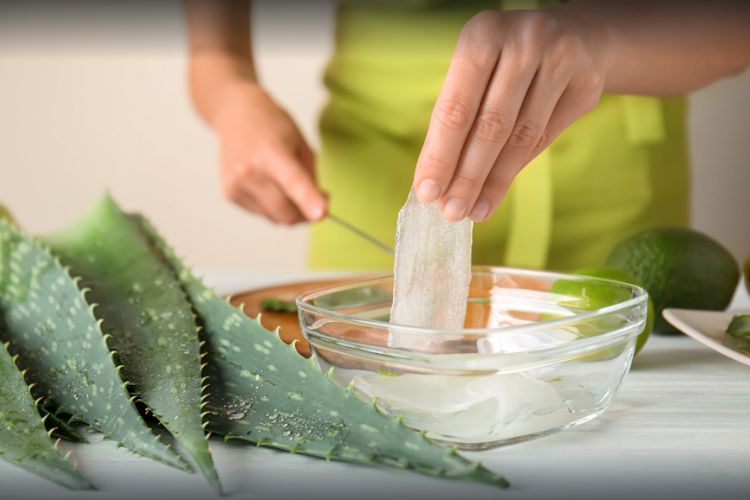 Aloe vera is an ideal ingredient for anyone who enjoys creating homemade skincare. Here are a few easy DIY recipes you can try at home:
Aloe vera is an ideal ingredient for anyone who enjoys creating homemade skincare. Here are a few easy DIY recipes you can try at home:
Homemade Aloe Vera Face Mask
Ingredients:
- Two tablespoons of aloe vera gel (fresh or bottled)
- One teaspoon of honey
- One tablespoon of yogurt
Instructions:
- Mix all ingredients in a small bowl until well combined and smooth.
- Apply the mixture evenly to your face, carefully avoiding the eye area.
- Leave the mask on for 15-20 minutes.
- Rinse with lukewarm water and softly pat your skin dry with a towel.
This mask is ideal for dry or irritated skin. Aloe vera provides hydration, honey is a natural humectant, and yogurt adds a gentle exfoliating touch.
Aloe Vera Toner
Ingredients:
- 1/2 cup of fresh aloe vera gel
- 1/2 cup of distilled water
- 1-2 drops of tea tree oil (optional)
Instructions:
- Mix the aloe vera gel and distilled water until well combined.
- Add a drop or two of tea tree oil for extra acne-fighting power.
- Transfer the mixture into a spray bottle and apply it as a toner after cleansing your face.
This toner helps to balance the skin’s pH levels while providing hydration and a soothing effect, especially for acne-prone skin.
Aloe Vera and Honey Body Scrub
Ingredients:
- 1/2 cup of aloe vera gel
- 1/4 cup of honey
- 1/2 cup of brown sugar
Instructions:
- Mix the aloe vera gel, honey, and brown sugar in a bowl until well combined.
- Gently massage the scrub in circular motions while in the shower to exfoliate.
- Rinse with warm water to unveil soft, smooth skin.
This scrub is perfect for exfoliating without drying out your skin, thanks to the moisturizing properties of aloe vera and honey.
Embrace Aloe Vera for Naturally Radiant Skin
Aloe vera is nature’s gift to skin care, providing soothing, healing, and hydrating benefits for all skin types. From relieving sunburns and acne to hydrating dry skin and addressing more chronic skin conditions like eczema, aloe vera is the ultimate multitasker in any skincare routine. Its versatility makes it an excellent addition to store-bought products and DIY recipes. Whether you’re looking to heal, soothe, or moisturize, aloe vera is a natural, accessible option to transform your skin.
Incorporating aloe vera into your routine doesn’t have to be complicated. With the variety of products available and straightforward DIY recipes you can make at home, there’s no reason not to reap the rewards of this powerhouse plant. So why not give it a try? Your skin will thank you for it.

